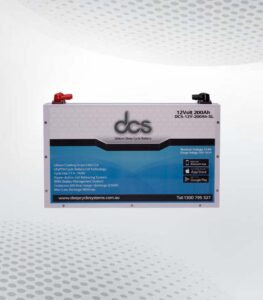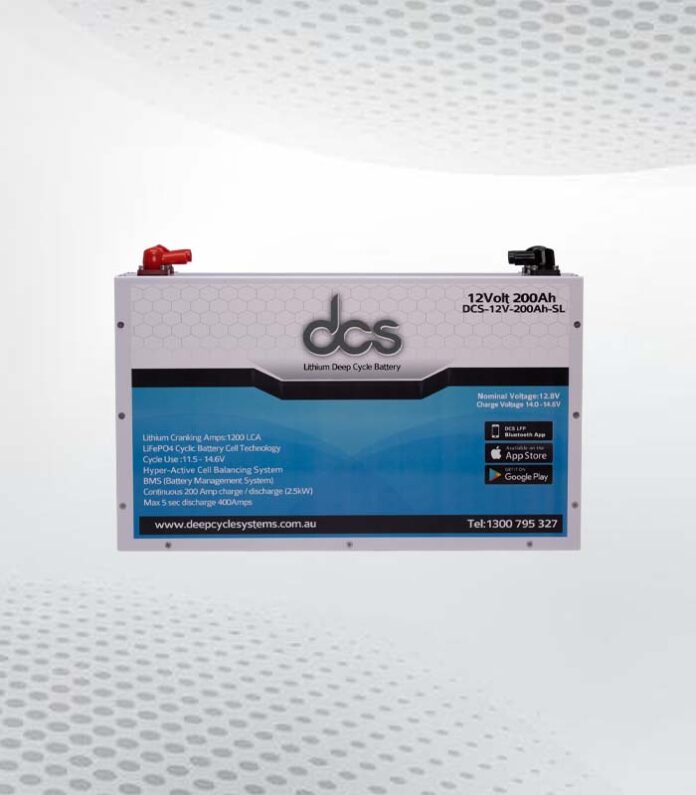Li ion battery 200ah has come a long way in revolutionising energy storage solutions. With the advent of the 200Ah capacity, these batteries are now more powerful and versatile than ever before. This blog post will explore the basics of Li-ion batteries, the benefits of the Lifepo4 200-ah, their applications in modern technology, safety considerations, and how to make an informed choice for your energy needs.
Understanding the Basics of Li-ion Batteries
Li-ion batteries, a cornerstone in the realm of rechargeable power sources, harness lithium ions moving between the cathode and anode to generate electricity.
Central to their operation is the lithium compound that forms part of the battery’s electrolyte, a medium that facilitates the seamless flow of ions whilst the battery charges and discharges. Distinguished by their high energy density, these batteries can store a substantial amount of energy relative to their size, which is a critical factor in their widespread adoption across various electronic devices and electric vehicles.
Another hallmark of Li-ion technology is its impressive cycle life. These batteries are capable of numerous charge and discharge cycles before they exhibit any significant degradation, ensuring longevity and reliability for users.
Additionally, they are lauded for their minimal self-discharge rates. Unlike other rechargeable batteries that lose a significant portion of their charge over time when not in use, Li-ion batteries maintain their charge for a longer period, making them a dependable source of power.
This combination of high energy density, longevity, and low self-discharge rate positions Li-ion batteries as a pivotal technology in energy storage, powering not only everyday portable electronic devices but also playing a crucial role in the transition towards cleaner, renewable sources of energy and electrification of transport.
The Advent of the 200Ah Capacity
The introduction of Li-ion batteries with a 200Ah capacity marks a significant leap forward in the realm of energy storage. This development ushers in a new era of efficiency and utility, enabling devices and systems to operate for extended periods without the need for frequent recharging. Such a substantial capacity proves transformative for sectors reliant on sustained power supply, notably in renewable energy storage solutions and electric vehicle technology.
The increased capacity directly translates to enhanced endurance and reliability for applications demanding considerable energy reserves. For instance, off-grid solar power setups benefit immensely, as these batteries can store ample power during the day to meet energy needs throughout the night, even in the absence of sunlight. Similarly, electric vehicles equipped with 200Ah Li-ion batteries achieve longer ranges per charge, reducing range anxiety among users and paving the way for wider adoption of clean transportation options.
Beyond mere endurance, the 200Ah capacity supports the push towards greener, more sustainable energy usage by allowing for more efficient capture and utilisation of renewable resources. This aligns with global efforts to transition away from fossil fuels, presenting a viable and attractive option for energy storage that complements the intermittent nature of renewable energy sources.
Key Benefits of the Lifepo4 200ah
The Lifepo4 200Ah battery distinguishes itself through its array of advantages that cater to a broad spectrum of energy requirements. Its exceptional energy density signifies that a substantial amount of power is contained within a compact form, facilitating its integration into diverse applications without the bulk typically associated with lower density batteries. This characteristic is particularly advantageous in mobile and portable systems where space and weight are critical factors.
Accelerated charging capabilities emerge as another significant benefit, enabling rapid energy replenishment. This feature is invaluable in scenarios demanding quick turnaround times, such as in electric vehicles and emergency backup power systems, where prolonged downtimes are not feasible.
Moreover, the Lifepo4 200-ah battery is celebrated for its enduring cycle life, surpassing many alternatives by offering thousands of charge-discharge cycles before any noticeable decline in capacity. This longevity translates to reduced replacement frequency, thereby enhancing the overall cost-effectiveness and sustainability of the systems in which these batteries are deployed.
Thermal stability and safety stand out as fundamental attributes of the Lifepo4 chemistry. These batteries inherently resist overheating and are less prone to thermal runaway, a common concern in other battery types. Consequently, they offer a safer option for high-demand applications, mitigating risks of accidents and enhancing user confidence.
Collectively, these benefits underscore the Lifepo4 200-ah battery’s role as a reliable, efficient, and safe choice for meeting today’s energy storage challenges, while also supporting the transition towards more sustainable energy solutions.
Applications of Li-ion Battery 200Ah in Modern Technology
The arrival of 200Ah Li-ion batteries is reshaping the landscape of contemporary technology, unlocking new horizons for various sectors. These high-capacity batteries are integral to electric vehicles (EVs), significantly extending their range and reducing charging intervals, thus addressing one of the critical barriers to EV adoption.
In the renewable energy domain, these batteries are pivotal for solar and wind power storage systems, allowing for the efficient capture and storage of energy generated during peak hours for use during periods of low generation or high demand. This capability is instrumental in enhancing the reliability and effectiveness of renewable energy sources, making them more viable as primary power supplies.
Furthermore, 200Ah Li-ion batteries are revolutionising the realm of portable power, providing robust energy solutions for remote or mobile applications such as camping equipment, high-capacity power banks, and mobile medical devices. Their ability to deliver sustained power output without substantial weight or bulk makes them ideal for scenarios where mobility and reliability are paramount.
In the industrial sector, these batteries are being deployed in backup power systems and for energy stabilisation on the grid, ensuring continuity of operations and mitigating fluctuations in power supply. The adoption of 200Ah Li-ion batteries across these diverse applications not only underscores their versatility but also highlights their role in facilitating a shift towards more sustainable and efficient energy use across the globe.
Comparing Li-ion with LiFePO4 Batteries
When delving into the nuances between Li-ion and LiFePO4 batteries, several distinctions become apparent, each catering to specific requirements based on their unique properties.
LiFePO4 batteries, also known as lithium iron phosphate batteries, stand out for their robust safety profile. This characteristic is attributed to their exceptional thermal stability, which significantly minimises the risk of overheating and thermal runaway – a scenario where batteries become excessively hot and potentially hazardous. This makes LiFePO4 a preferred choice in applications where safety is a paramount concern.
Another point of differentiation lies in the cycle life of these batteries. LiFePO4 batteries boast a remarkably long cycle life, often capable of enduring thousands of charge-discharge cycles before any notable degradation in performance occurs. This longevity is particularly advantageous for systems requiring frequent cycles over an extended period, offering a sustainable option with a lower total cost of ownership.
On the other hand, Li-ion batteries are celebrated for their superior energy density. This allows for a smaller and lighter battery to deliver the same power as a larger LiFePO4 unit, making Li-ion batteries especially suited for applications where space and weight are critical constraints. Furthermore, Li-ion technology generally offers quicker charging times compared to LiFePO4, a feature that can be critical in scenarios where rapid replenishment of power is necessary.
Both battery types serve pivotal roles in modern energy systems, with the choice between them largely influenced by the specific demands of the application in question, whether prioritising safety and longevity or energy density and charging speed.
Safety Considerations and Best Practices
 Adhering to safety guidelines is paramount when utilising Li-ion batteries to avert potential hazards and guarantee their optimal functioning. It is crucial to avoid exposing the batteries to extreme temperatures, both hot and cold, as this can adversely affect their performance and longevity.
Adhering to safety guidelines is paramount when utilising Li-ion batteries to avert potential hazards and guarantee their optimal functioning. It is crucial to avoid exposing the batteries to extreme temperatures, both hot and cold, as this can adversely affect their performance and longevity.
Proper charging practices cannot be overstated; always utilise the charger provided by the manufacturer or one that is specifically recommended. Overcharging or using incompatible chargers can lead to battery damage or pose safety risks.
Additionally, one should never tamper with or attempt to disassemble the battery, as this could compromise its structural integrity and safety mechanisms. Regular inspections for signs of damage or wear are advisable, and any concerns should prompt immediate cessation of use and consultation with a professional.
It’s also imperative to heed the manufacturer’s guidelines regarding storage, ensuring batteries are kept in a secure, ventilated area, away from combustible materials. Proper disposal is equally important; batteries should never be discarded in regular waste. Contact local recycling centres or follow community guidelines for disposing of electronic waste responsibly, thus mitigating environmental impact and adhering to regulations.
Making an Informed Choice for Your Energy Needs
Selecting the right Li-ion battery, particularly a 200Ah model, requires careful evaluation of several key parameters beyond mere capacity. Voltage compatibility with your intended application is paramount; ensure that the battery’s voltage aligns with your device or system’s requirements.
Equally critical is assessing the battery’s cycle life, which indicates how many charge and discharge cycles it can undergo before performance begins to significantly deteriorate. This is indicative of the battery’s longevity and can influence overall value for money in the long run. It’s advisable to opt for batteries from manufacturers that are renowned for their quality and reliability.
Such brands are more likely to provide batteries that consistently perform as advertised and have stringent safety standards in place. Consulting with energy storage experts or seasoned users can provide practical insights and help you navigate through the plethora of options available. Additionally, consider warranties and after-sales support offered by the manufacturer, as these can be indicative of the product’s quality and the company’s confidence in its performance.
By meticulously analysing these factors, you can identify a Li-ion battery that best suits your energy requirements, ensuring a blend of efficiency, safety, and durability.
FAQs
Is it possible to fit a li ion battery 200ah in an electric vehicle?
Certainly, electric vehicles can be equipped with 200Ah Li-ion batteries, which are designed to enhance the vehicle’s range and power output, contributing to longer journeys without the need for frequent charging stops.
What is the expected lifespan of a Lifepo4 200ah battery?
The Lifepo4 200ah battery is noted for its durability, with an expected lifespan extending up to a decade or beyond, depending on the battery’s usage patterns and adherence to recommended maintenance practices.
Can Li-ion batteries be safely incorporated into residential energy storage systems?
Li-ion batteries, when deployed correctly and with adherence to specified safety measures, are deemed safe for residential energy storage purposes. It is, however, essential to engage a professional for their installation and upkeep to ensure optimal safety and performance.
Conclusion
To encapsulate, the evolution of 200Ah Li-ion batteries heralds a pivotal moment in the development of energy storage technologies. These powerhouses are distinguished by their remarkable energy storage capacity, rapid recharging capabilities, and enduring cycle life, positioning them as versatile solutions for a myriad array of applications. From driving the push towards electric vehicles to stabilising renewable energy systems, their impact is far-reaching.
| Other Good Articles to Read |
| Gabrielle Blogs |
| Jason Toff Blogs |
| Thumb Blogs |
| Blog Shifter |
| Social Bookmarking Blogs |
| Free Blogs Template |
| Blog Solidaire |
| Michael Coyne Blog |
| Born Free Blog |
| Oz Blog Hosting |
| Indepth News |
| Link Forum |
| Related Business Listings |
| Directory Submissions |
| Regional Directory |



